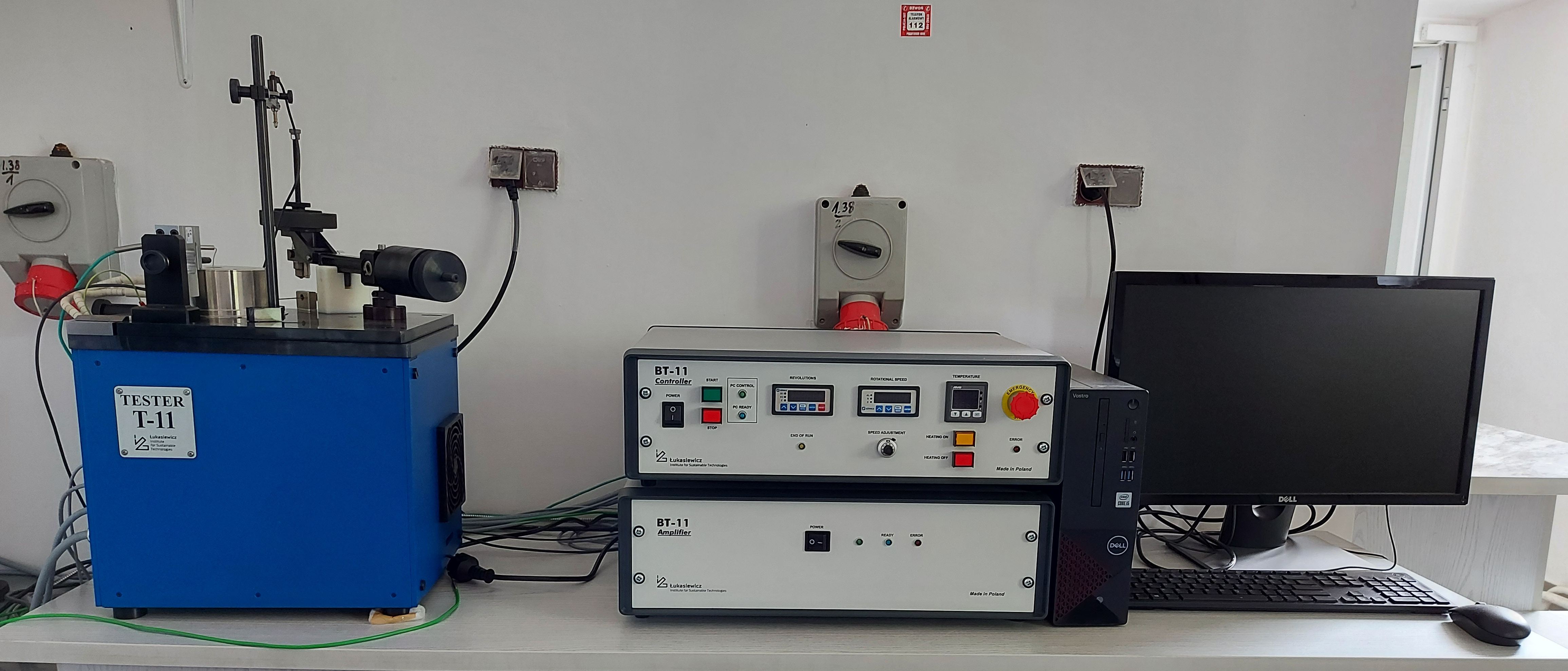- University of Lodz
- Faculty of Chemistry
- Department of Materials Technology and Chemistry
- Experimental techniques and apparatus
- Macro-scale friction
Macro-scale friction
Tribotesters for macro-scale testing
For macro-scale friction testing, we have a pin on disc friction measurement system (T-11) and a four ball tester.
Ball on disc or pin or disc tribometer (T-11)

The device was designed and manufactured by the Institute for Sustainable Technologies in Radom to determine the tribological properties of materials used in friction nodes of machines. The tester can be used to test metals, plastics, ceramic materials and thin coatings under dry friction or lubrication conditions, in the environment of air or a specific gas, at various temperatures.
On the T-11 device one can determine or observe:
- seizure conditions
- the influence of surface treatment on friction and durability of machine elements
- the influence of running-in on tribological phenomena
- tribological characteristics of solid, plastic and liquid lubricants
- influence of ambient and gas temperature on friction and wear
- tribopolymerization phenomena
The T-11 device consists of two basic units:
- testing machine
- measurement system
The testing machine consists of: a body, a sliding plate, a drive unit, a sample mounting unit, a friction sensor unit and a heating chamber.
The test elements in the T-11 are a counter-sample in the form of a disc and a sample in the form of a pin or ball mounted in special holders.
Parameters characterizing the friction node in the T-11 apparatus:
- type of contact: flat (plane on plane) formed by a rotating disc and a pin pressed against it, or concentrated (plane on ball) formed by a rotating disc and a ball pressed against it.
- type of movement: sliding during the test at constant speed
- contact lubrication by immersion method
- range of friction force value 2-50 N
- ambient temperature of the friction node adjustable from room temperature to 300°C
The balls used in the tester have diameters of 1/4" and 1/8". The maximum diameter of the disc is 1" (25.4 mm). It is also possible to change the friction radius from 0 mm to 10 mm, contact load, sliding speed, time and friction distance.
The measuring system is designed to:
- measuring: friction force, ambient temperature of the friction node, spindle speed, test duration
- measuring: friction force, ambient temperature of the friction node, spindle speed, test duration
- temperature regulation in the heating chamber
- data collection (friction force, temperature, speed, time)
The results of motion resistance tests constitute tribological characteristics, determining the relationship between the friction coefficient and the sliding speed and unit pressures in the friction zone. The first of the indicated relationships shows us the condition of the friction surface as the measurement progresses, the second allows us to draw conclusions regarding the tribological properties.
Based on: ITEE Radom
Standard four ball tester
It allows for testing wear processes in the presence of liquid lubricants and greases. It works in the load range of 10-1000 kg. It is mainly used to test the anti-wear properties of lubricant additives.
